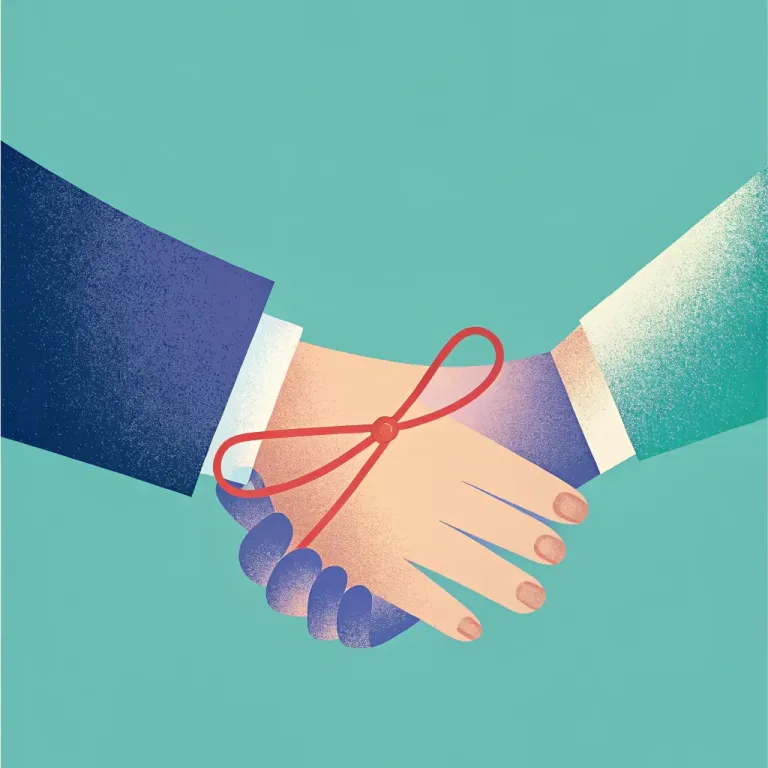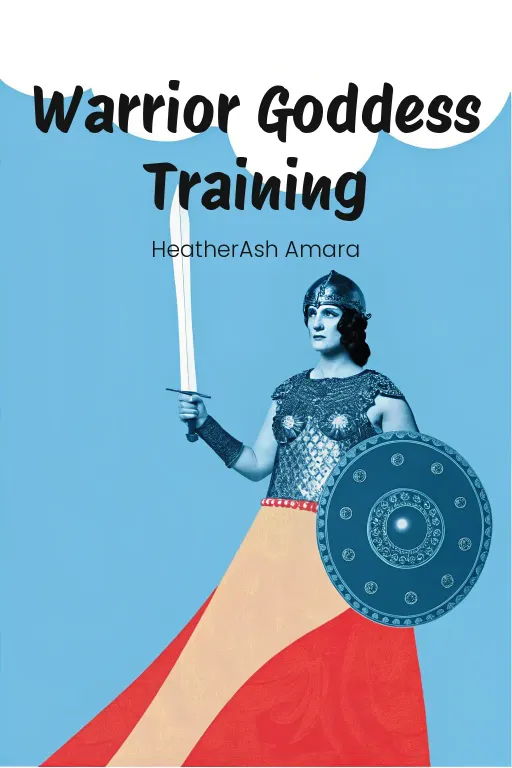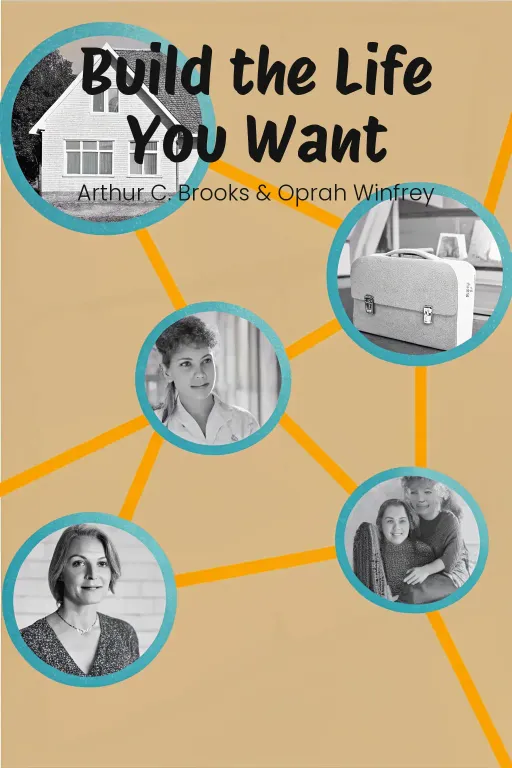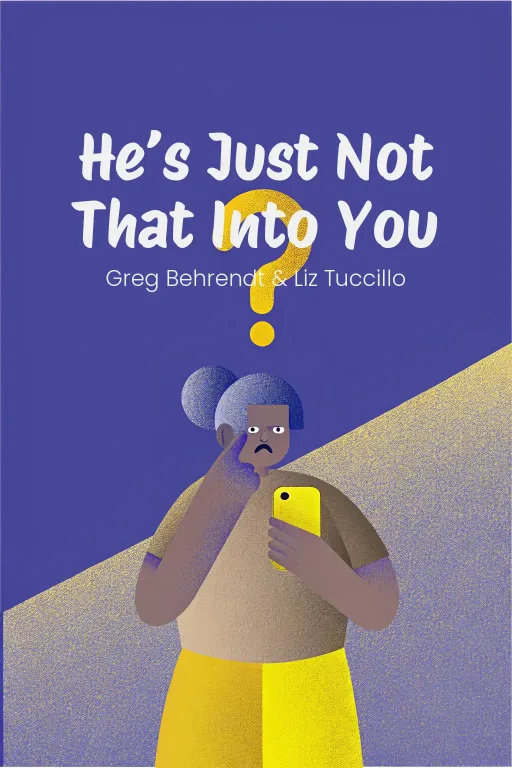
Love's Blueprint: Build Confidence, Not Dependence
Podcast by Beta You with Alex and Michelle
How to Raise Your Standards, Find Your Person, and Live Happily (No Matter What)
Introduction
Part 1
Alex: Hey everyone, welcome to the show! Today, we're tackling something pretty universal: love. Whether you're single, dating, or in a long-term relationship, love is that force in our lives that can be both incredibly wonderful and, well, incredibly frustrating. Michelle: Frustrating is putting it mildly, Alex. It often feels like trying to assemble IKEA furniture without the instructions. So, what’s our roadmap for navigating this emotional minefield today? Alex: We're diving into Love Life by Matthew Hussey. Think of it as a modern guide to understanding and improving your relationships – starting with yourself. Hussey uses a mix of personal anecdotes, sharp observations, and actionable advice to help us break free from unhealthy patterns, communicate more openly, and build self-assurance that doesn't depend on external validation. Michelle: Ambitious stuff. Let me guess, he also promises to help us unlock some secret, magical key to love, right? Alex: He does talk about magic, but with a twist. It’s not about finding some external magic, but about cultivating your own inner happiness and direction. He rethinks a lot of those traditional romantic ideas and provides a different take on how we connect with others. Michelle: Okay, so how are we breaking this down today? Alex: We’ll explore this in three parts. First, we’re building the groundwork: self-worth and authenticity. Like building a house, if the foundation is weak, everything else is going to crumble, right? Then, we’ll look at communication and boundaries, those essential walls and doors that keep everything secure and functional. And finally, we’ll delve into resilience and growth, because like a garden, relationships require care and attention to flourish. Michelle: Houses, gardens… got it. Let’s see if Hussey’s got the secret to a thriving romantic ecosystem.
Self-Worth and Authenticity in Relationships
Part 2
Alex: Okay, let's dive into the groundwork here—self-worth and being real in relationships. Matthew Hussey really emphasizes that before you even “think” about connecting with someone, you absolutely have to know who you are and feel good about it. He calls it building "core confidence," and that's way different than, say, feeling good because you nailed a presentation at work or found the perfect filter for your selfie, right? Michelle: Right, so it's not those fleeting moments of feeling good – it's something much more fundamental. But, Alex, how do you actually build this "core confidence"? I mean, it sounds great, but how does it work in practice? Alex: Good question! Hussey suggests something he calls the "Identity Matrix". It's basically an exercise to map out all the different areas of your life—your career, your friendships, what you enjoy in your free time, what you value—and really see where you're getting your sense of self from. So, imagine if someone tied their entire self-worth to their job. When things are going well at work, they’re flying high, but the second they have a bad day, boom, their confidence just crashes. That's a red flag, right? It shows a real imbalance. To fix that, they could start focusing on friends, picking up new hobbies, just building a more rounded life. Michelle: That makes perfect sense. It's like diversifying your investments so you don't lose everything if one stock goes south! Alex: Exactly! By creating balance, you're less likely to base your worth on one single thing outside of you—whether that's a job, a relationship, or even just likes on social media. And that's key for relationships. You're not looking for someone to complete you; you already feel complete. You connect from a place of strength, not neediness. Michelle: Okay, I get it. But, let's be honest. What happens when people don't do this work? What does that imbalance look like when it plays out in a relationship? Alex: Well, it often looks like giving up your own identity. Hussey talks about people who start dating someone and suddenly feel they have to become a carbon copy of their partner while leaving their own passions aside. It's as though love has to mean losing who you are which is a really dangerous trap. Without core confidence, you might start thinking, "If I don’t put the relationship above everything, it's going to end". Michelle: Which, if we're being real, then the relationship becomes a performance, not an actual partnership. You're basically editing yourself all the time to keep the other person interested. Alex: Right. But with core confidence, the whole thing changes. You don't shrink yourself; you bring your whole, authentic self. And that enriches the relationship because it's built on mutual respect and shared life is experiences. Michelle: I hear you. But let me play devil's advocate. Isn't it human nature to want validation? I mean, not every single minute, but don't we all want to feel… valued or appreciated? Alex: Absolutely, Michelle. We all enjoy that, it's a normal part of being human. But core confidence doesn’t mean rejecting validation altogether. It means not depending on it. Think of it this way: superficial confidence only thrives when things are going great—someone’s showering you with compliments, or you're hitting all your targets. Real core confidence can weather storms, you know? It's the difference between being okay with who you are even on your bad days, versus just falling apart when someone doesn't text you back or you feel like you're not being seen. Michelle: So, it's having an, so to speak, emotional insurance policy. You're shielded from things that might otherwise throw you completely off balance. Alex: Exactly. And here’s something else important you need to consider: if you're avoiding this inner work, you might also be more vulnerable to old programming… you know, from your past. Michelle: Harmful conditioning? You're talking about those, kind of, emotional scars we're all dragging around? Alex: Exactly. Hussey explains how past experiences shape how we approach love—like someone who's been cheated on might develop defense mechanisms like avoidance or being overly accommodating. He shares a story of Maria, she was in a relationship, but she didn't mention her feelings about whether they were exclusive or not, because in the past she'd been rejected and neglected. Instead of being clear about her expectations, she stayed stuck in limbo because she was afraid of being hurt again. Michelle: So, fear stops her from speaking up. But isn't that just kicking the can down the road? Alex: It is. Avoidance just leads to this unresolved tension that ends up hurting the connection anyway. Hussey's advice here is really powerful: ask yourself if your fears are about the present or from something that happened in the past. For Maria, bringing up her anxiety directly—and asking her partner what they wanted—might have been scary, but it would have given her an answer and a chance to shape her own story. Michelle: This clarity comes back to trusting yourself, am I right? Without that, the whole cycle just continues. Alex: Exactly! And this leads into the last piece of what we're talking about today: moving away from a scarcity mindset and towards relational clarity. If you don't believe there's enough love to go around, it's easy to cling to relationships—even not-so-great ones—because you're afraid you won’t find anything better. Michelle: The infamous "I better hang onto this one, or I'll end up alone with a bunch of cats" mentality. Let's be real, society doesn't help with that, does it? Alex: Absolutely. Hussey points out how external narratives, like societal expectations about when you should be married or have kids, can make that scarcity feel even stronger. It’s hard for women, especially—they often feel like their value decreases over time if they're single. That leads to settling or overlooking red flags just to avoid being alone. Michelle: So, the answer is… what? Embrace being alone time? Alex: Yes! But not like it's some kind of punishment, but more like an opportunity to grow as a person. Hussey reframes being alone as a time to reconnect with what you value and rediscover what truly matters to you. When you see your worth has nothing to do with whether you're in a relationship, that confidence is very attractive and it influences your dating life. Suddenly, you're choosing partners based on whether they're actually right for you, not out of desperation. Michelle: So, instead of asking, "Why doesn't anyone want me?" You ask, "Does this person even deserve me?" Alex: Exactly. It’s about shifting from trying to fill a void to being a whole, authentic person who's looking for an equal partner. That, Michelle, changes the whole dynamic of love.
Effective Communication and Boundary-Setting
Part 3
Alex: Okay, so we've established self-worth as our foundation. Now we're diving into the trickier territory of communication and setting boundaries in relationships. This is where the rubber meets the road. We're moving from that internal work—knowing ourselves—to actually putting it into practice in our relationships. How do we express our needs? How do we maintain our sense of self while still building strong connections? This is really where personal growth meets real-world relationships. Michelle: Right, because knowing your value is one thing, but actually applying that when you're dealing with all the complexities and curveballs relationships throw at you? That's the hard part. So, where does Hussey start with this? Alex: He really focuses on those honest, even tough, conversations. He argues that avoiding these discussions—whether it's about commitment, unmet needs, or setting boundaries—is a major pitfall. He gives this example of Maria, who's five months into a relationship and is “really” invested, but she's terrified to ask her partner where things stand, if they are exclusive or not. Michelle: Let me guess, because she's worried about the answer? Alex: Precisely! She's scared the conversation won't go her way or that it'll somehow ruin the current situation. But by avoiding that conversation, she's stuck in a state where what she assumes and what's actually happening don't line up. Michelle: So, instead of getting the clarity she needs, she's running on fumes, emotionally speaking. The longer she puts it off, the bigger the mess when reality finally hits, right? Alex: Exactly. Hussey uses her story to illustrate how avoiding those tough conversations doesn't actually save us from discomfort, it just postpones it, and often makes it worse. If Maria had just addressed her concerns earlier, she could have saved herself a lot of grief, no matter the outcome. Michelle: Okay, but tough conversations are tough for a reason, right? Where do you even start without sounding like you're attacking the other person or making them defensive? Alex: That's where Hussey's advice is “really” helpful: he suggests using neutral, non-judgmental language. Instead of just blurting out, "What are we doing? Are you serious about me, or what?" which can feel accusatory, he suggests framing it as a collaborative discussion. Something like, "I've “really” loved spending time with you, and I'm feeling more invested in this relationship. I'd like to talk about where we're going and how we both see things." Michelle: So, it's less about cornering someone and more about hearing their perspective. It's a much gentler, less confrontational way to approach it, which makes sense. Alex: Exactly. It creates a safer space for both of you to share how you're feeling, which is essential. And Hussey goes a step further, recommending that you prepare for these conversations ahead of time. Think about what you want to say and what you hope to achieve—that can help you feel more grounded and confident going in. Michelle: That's a smart approach—rational, not reactive. But let's say you've done all the preparation, you've tried to be empathetic, and the outcome still isn't what you wanted. What happens then? Alex: That's where self-respect and accountability come in. Hussey emphasizes that while you can't control how someone else reacts, you can control how you handle your own response. He thinks that walking away from a situation where your needs aren't being met is an act of self-love. It's about seeing that the act of seeking clarity is a victory in itself, because it validates your worth, regardless of the outcome. Michelle: Okay, so clarity is key. But what if the issue isn't just communication? What if someone's behavior is crossing the line and boundaries aren't being respected? Alex: That's the next piece: setting healthy boundaries. Hussey describes boundaries as the framework that supports strong relationships. They make sure that both people feel respected and valued without sacrificing their own individuality. Michelle: Boundaries seem like one of those things everyone talks about but struggles to actually do. What's the secret? Alex: It's about balance. Hussey talks about how empathy often gets confused with enabling bad behavior. He uses the story of a woman who was frustrated because her boyfriend wouldn't communicate when they were apart. At first, she held back because she didn't want to seem "needy." But when she finally explained how his silence made her feel, calmly and thoughtfully, he respected her point of view and changed his behavior. Michelle: So, setting boundaries isn't about trying to control someone—it's about clearly stating what you need to feel secure and valued. Alex: Exactly. It's not about telling someone else what to do, but about saying what works for you and what doesn't. If they value you, they'll respect those lines. Michelle: All right, but what if those boundaries keep getting crossed? Surely Hussey isn't suggesting you just have the same conversation over and over? Alex: Definitely not. That's where he introduces some practical strategies. For example, regular relationship check-ins can help you spot small problems before they blow up. Think of it as routine maintenance—making time for both people to discuss needs and expectations openly. Michelle: Like getting an oil change instead of waiting for your engine to die. Alex: Exactly! And when problems do come up, another strategy is to talk about the specific behavior, not the person. So, instead of saying, "You're so insensitive for ignoring me," you could say, "When you don't text me back for hours, it makes me feel underappreciated." Michelle: That sounds way more constructive—and probably gets a better response, too. Alex: Absolutely. And here's a key point: boundaries need to be reinforced with action. If your partner consistently interrupts your personal time, you might need to take a step back temporarily to show that your boundaries aren't just suggestions. Standing firm shows self-respect, which ultimately encourages them to respect you, in return. Michelle: And if they still don't get it? Time to ask yourself if the relationship is even worth saving. Alex: Exactly. Hussey even recommends couples counseling in some cases, to address those deeply ingrained patterns. A professional can help you navigate those conversations and find fair solutions. Michelle: Okay, I'll give Hussey credit. Communication and boundaries aren't just abstract concepts as they are usually framed. Using these tools, it feels like you can actually take control of your relationships, instead of just hoping everything magically aligns. Alex: And that's “really” his whole point—that true empowerment is about honoring your own emotional needs while also respecting the other person. Honest conversations and clear boundaries aren't just about resolving conflicts. They're about building a framework where both people can grow together while keeping their own identities.
Emotional Resilience and Personal Growth
Part 4
Alex: So, with a strong sense of self and solid communication skills under our belt, it's time we talk about how to actually “deal” with life when it throws you a curveball, you know? Basically, building resilience in love and, well, in everything else! Hussey really expands beyond just romantic relationships here, focusing on emotional resilience and personal growth for navigating all of life's uncertainties. We're talking about addressing past hurts, rethinking what happiness “actually” means, and turning those uncomfortable moments into opportunities for growth. Michelle: Okay, so we're pulling back the lens a bit. Not just pinpointing romance issues, but looking at, how do we cope when life just... happens? I like that. Seems more practical somehow. But where do you even start with resilience? It's such a big concept. Alex: Hussey breaks it down into manageable steps, the first being processing emotional pain. His point is you need to actually “face” discomfort instead of running from it. He uses great examples to show a path forward. Take Courtney’s story: after years of marriage, she found out her husband was unfaithful. Devastating, right? But instead of letting it crush her, she used it to reflect on how the marriage drained her and how she could reclaim a sense of freedom she didn't realize she'd lost. Michelle: Hold on. She turned “betrayal”, one of the worst things that can happen in a relationship, into...liberation? That's a pretty big reframe, right? Seems almost impossible. Alex: Well, it's not about saying the pain didn't exist, but acknowledging the pain, and then asking, "Okay, what can I learn from this? What could I possibly “gain” from this loss?" For Courtney, the discomfort forced her to confront the years of anxiety and neglect she'd been suppressing to maintain the facade of a "happy marriage." Letting go of the marriage, though incredibly painful, gave her the space to kind of rediscover herself? Michelle: Okay, but… doesn't that sound a little…forced? I mean, telling someone in the middle of that kind of devastation to look for a "silver lining" almost feels dismissive, doesn’t it? Alex: I see what you mean, but I don’t think it’s about immediate positivity at all. It’s more about shifting your focus over time. Hussey suggests things like, journaling to really unpack what the pain is telling you about your own needs and desires. It’s not about denying your grief; it’s about using it to clarify what truly matters to you moving forward. Michelle: Alright, fair enough. Still, grief can really mess with your judgment, right? When you're in that headspace, how do you even begin to figure out where to start? Alex: Well, that's where Hussey emphasizes self-compassion. Treat yourself with the same kindness you’d give to a friend who’s going through a tough time. Allow yourself to feel everything, without judgment, and then gradually work on shedding the habits or stories that are holding you back. And he mentions supportive environments. Leaning on friends, family, or even seeking therapy can be so helpful when you don't have the bandwidth to think clearly. Michelle: Okay, I get it. So, less about "powering through" and more about creating space for yourself, to heal at your own pace, right? Alex: Exactly! And as part of that, you're kind of rebuilding your sense of self. Hussey gives some clear strategies for this, like revisiting hobbies you might have let slide or connecting with interests that have nothing to do with your relationships. He uses the example of Audrey, who, after a breakup that left her feeling lost, dove into a fitness retreat. Pushing her body, helped to realize she had the ability to overcome difficulties that she hadn’t ever imagined. Michelle: I like that metaphor. Physical challenges mirroring emotional resilience. But isn't there a risk of using things like running or hobbies as just a distraction, rather than actual growth? Alex: That's a great question, and the answer really depends on your intention. Are you using it to numb the pain? Then yeah, probably avoidance. But, are you using hobbies or challenges, like Audrey, as a way to reconnect with who you are and what you're capable of, then it becomes something transformative. Rediscovering hobbies reminds you that your identity isn't just tied to another person—it's entirely your own. Michelle: True, true. Now, let's address the elephant in the room: quick fixes. We've all seen it, right? Breakups followed by rebounds or, you know, reckless spontaneity. What's Hussey's take on that? Alex: He cautions against it for the exact reason you mentioned. They mask the pain, instead of really helping you process it. A rebound relationship might temporarily ease the loneliness, but it runs the risk of carrying all your baggage into the next dynamic. And you risk repeating unhealthy patterns because you haven’t done the work to break them. Michelle: No post-breakup tattoos, impulsive plane tickets, or hasty Tinder swiping. Noted. Alex: <Laughs> Well, sure, you can take that plane ticket, as long as it's for self-renewal and not for avoidance. Hussey’s point is, that meaningful growth comes from sitting with that discomfort, not avoiding it. And he says to stop romanticizing past relationships, which is something we are all guilty of doing! Michelle: Ah, yes, the nostalgia goggles. Where every ex starts, somehow, looking like a flawless angel the moment they're out of your life. Alex: Exactly! Hussey talks about how people tend to highlight the good times and forget why things went wrong – manipulation, incompatibility, or neglect. And by looking at a relationship honestly, with balanced view, you learn what you should prioritize in the future, without that rosy haze clouding your judgment. Michelle: Sounds like a dose of reality that people desperately need. Okay, let’s move on to this "happy enough" philosophy, and I think I know what you’re going to say here, but it sounds like you're basically telling people to lower their standards? Alex: Not at all! It's about moving away from this pursuit of perfection, which is an illusion that basically guarantees disappointment. Hussey uses the story of Mel Abraham, who battled cancer and decided to focus on what he could create moving forward, instead of fixating on what he’d lost. And the takeaway here is: happiness isn’t found in “perfect” circumstances, but it’s found in progress, in making something meaningful out of what you “do” have. Michelle: So, it's almost like the emotional equivalent of Marie Kondo: focusing on what sparks joy, instead of fixating on what's missing. Alex: That’s a great analogy! Shifting your mindset to appreciate "good enough" doesn’t mean accepting mediocrity, so much as it is valuing progress and accepting that life, just like love , is inherently imperfect. Small wins, like speaking up for yourself or learning something new, build into something far more powerful over time. Michelle: And that goes hand-in-hand with resilience, right? Turning those stumbles into stepping stones. Alex: Exactly! Hussey argues that pain itself is a teacher, not necessarily your enemy. When you reframe it as an inevitable part of growth, you stop seeing it as just suffering and start seeing it as a catalyst. And he emphasizes self-compassion and adjusting your expectations, realizing that healing isn’t linear and setbacks are just part of it. Michelle: So, no beating yourself up about bad days or moments of weakness, got it. Alex: Right! Resilience isn’t about never feeling weak, it’s about how you respond to those moments with perspective and grace. And by doing practices like, journaling you are able to reflect on growth, or simply sitting with those tough feelings instead of fighting them, and resilience becomes a natural part of personal growth. Which ties into the heart of this book, taking control of your story and creating joy from the inside out. Michelle: Okay, so, full circle. Resilience, growth, grit—it all starts with acknowledging that the struggles in life don't define, but they can definitely refine us.
Conclusion
Part 5
Alex: Alright, so to bring it all together, Matthew Hussey's “Love Life” really underscores that relationships, whether with others or even ourselves, flourish when we have self-awareness, when we're authentic, and when we're clear about what we want and need. We've touched on building that core confidence, unwinding those not-so-great patterns we fall into, and, most importantly, shifting our focus from seeking validation from outside to really valuing ourselves. Michelle: Right, so if you've actually taken all that to heart, and built that strong foundation—which I'm sure most people just say they've done—then it's also about stepping up your communication game and setting boundaries. I mean, having those difficult, honest conversations, respecting yourself and others, and knowing when to walk away instead of enabling the same old unhealthy behaviors. Do you walk away when you knew those thing going to happen again? Alex: Absolutely. And then there's also resilience—facing life's curveballs head-on, reframing the pains as opportunities for growth, and embracing progress instead of chasing this impossible ideal of perfection. It's about finding the strength in uncertainty and creating joy, not by chasing these idealized fantasies, but by really living authentically and meaningfully in the here and now. Easier said than done, of cause. Michelle: Okay, listeners, here's the million-dollar question: Take a long, hard look in the mirror, and ask yourself—are you making moves out of fear or a sense of abundance? Are you defining your own worth, or are you letting everyone else do it for you? Because most people do let others do it for them. Alex: Exactly! And remember, that magical love story? It doesn't start with someone else walking into your life. It starts when you take ownership of your own happiness and rewrite your story from a place of courage and, well, clarity. Michelle: So, go on, edit that story, set those boundaries, and plant some seeds for personal growth, would you? Because trust me, no relationship—least of all the one you have with yourself—should ever be about settling for anything less than you truly deserve.









